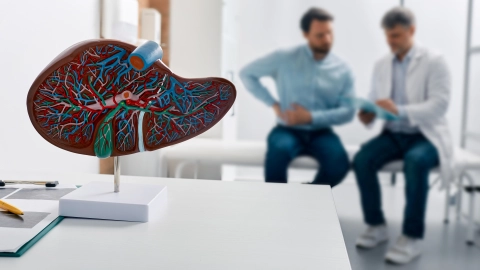Conditions Hepatitis A
ICD codes: B15 What are ICD codes?
Hepatitis A is an inflammation of the liver caused by the hepatitis A virus. It is often traced to traveling in countries with low sanitation standards. In the following you will find out how the infectious disease is treated and how infection can be avoided.
At a glance
- Hepatitis A is an acute inflammation of the liver caused by the hepatitis A virus.
- The pathogens are transmitted by contaminated drinking water, food and when in contact with infected persons.
- An infection is often transmitted when people are traveling in countries with low sanitation standards, but can be prevented by vaccination.
- Hepatitis A can generally be nursed at home.
- Once someone has recovered from an infection, they have life-long immunity.
Note: The information in this article cannot and should not replace a medical consultation and must not be used for self-diagnosis or treatment.

What is hepatitis A?
Hepatitis A is an acute inflammation of the liver. It is caused by the hepatitis A virus and often transmitted in countries with low sanitation standards through contaminated water or food.
“Hepar” is the Greek word for liver, hence the name hepatitis. Since there are different hepatitis viruses and forms of hepatitis, doctors give them different letters, from A to E.
What are the symptoms of hepatitis A?
The symptoms of hepatitis A vary considerably depending on the age of the person infected. The infection is usually mild in children or completely without symptoms, with the infection usually going unnoticed.
But adults, on the other hand, generally have symptoms that are rather non-specific at first:
- headache, muscle pain and joint pain
- lassitude and loss of appetite
- nausea and, rarely, vomiting
- occasional high temperature
- possible pain around the liver at the right costal margin
Doctors also call this non-specific stage of illness the prodromal stage. Only some of the people infected also have subsequent jaundice, also called icterus. In the icteric phase of hepatitis A, the white part of the eyes and the skin become a light yellow. This is because the inflamed liver is no longer able to pass the hemoglobin breakdown product, called bilirubin, into the intestine properly. At the same time, this makes the stool lighter, but the urine darker, because the bilirubin is now secreted via the kidneys. Icterus is also often associated with itching, occasionally with a mild rash.
How do people get infected with hepatitis A?
Hepatitis A viruses are excreted in the stool and transmitted by the “fecal-oral” route. This means that the excreted pathogens ultimately get back into someone else's mouth. If, for example, infected people do not wash their hands thoroughly after they have had a bowel movement, the viruses can be spread through hand shaking, but also through door handles and other objects. Close physical contact, for example in a kindergarten or in a shared household, increases the likelihood of infection. The risk of infection is also increased with sexual contact, especially anal sex.
Poor hygiene conditions can also result in hepatitis A viruses getting into the water system. The infection is then transmitted, for example, through contaminated drinking water or fruit and vegetables that have been washed in contaminated water, had contaminated water poured over them, or that were fertilized with feces containing pathogens. Another common source of infection is contaminated seafood, especially mussels and oysters. Imported contaminated fruit can also cause hepatitis A infections in Western developed countries.
As well as by the fecal-oral route, the infection can in rare cases also be spread through the blood, for example through using shared syringes when consuming drugs. Pregnant women can also pass the hepatitis A virus to their child.
What are infectious diseases?
The video below looks at when doctors talk about an infectious disease, which pathogens trigger infectious diseases, and how they are transmitted.
This and other videos can also be found on YouTube
Watch nowThe privacy policy indicated there applies.
How common is hepatitis A?
Hepatitis A occurs all over the world. In developing countries, almost everyone goes through an infection already in childhood or adolescence. But in developed countries with a high standard of hygiene, the prevalence of the disease has decreased significantly in the last few decades.
This has led to adolescents and adults no longer having any immunity to the virus and then getting infected when they travel to countries where the disease is widespread. About 1,000 to 1,500 cases of hepatitis A were recently reported every year in Germany, with the proportion of travel-related hepatitis being about 40 to 50 percent.
How does hepatitis A go on to develop?
After a person has become infected with the hepatitis A virus, it takes between two and seven weeks, on average 25 to 30 days, for the first symptoms to appear. The important thing to remember is that infected people are already contagious to other people one to two weeks before the onset of symptoms and up to one week after.
If jaundice (an icteric phase) follows the non-specific symptoms of the disease in a period known as the prodromal phase, this can last a few days to several weeks. The condition then returns to normal in a period of recovery lasting one to four weeks. The infection clears up without any complications.
In up to ten percent of cases, hepatitis A takes a particularly long time to clear up and can even last a few months. But hepatitis A is never chronic. In very rare cases, the infection is extremely serious and is associated with life-threatening liver failure. In these cases, older people whose livers were already damaged are particularly affected.
Once people have recovered from hepatitis A, the body stays immune to the virus for their whole lives.
How can hepatitis A be prevented?
Apart from good hygiene, vaccination is the best protection against hepatitis A. The vaccine contains killed hepatitis A viruses and is injected into the muscle. A person builds up immune protection within two weeks. A second vaccine dose should be administered at least six months later to guarantee long-term immunization, i.e. insensitivity to the pathogen. There are also combination vaccines against hepatitis A and hepatitis B.
The hepatitis A vaccination is particularly recommended for:
- people traveling to regions where hepatitis A is common, including most of the tropical areas, the Mediterranean and Eastern Europe.
- patients with liver disease.
- people who are particularly at risk of infection due to their sexual behavior.
- people with the blood disease hemophilia, regularly requiring blood products.
- residents of psychiatric facilities and other welfare institutions.
- people who are more likely to be exposed to the virus at work, such as healthcare professionals, people who work in day care centers or waste water management.
A subsequent hepatitis A vaccine or administration of immunoglobulins in people who have contact with people infected with hepatitis A can contain the infection within families, for example.
How do vaccinations work?
The video below explains how a vaccination works.
This and other videos can also be found on YouTube
Watch nowThe privacy policy indicated there applies.
How is hepatitis A diagnosed?
Hepatitis A is diagnosed using a blood test, with high liver values indicating liver inflammation. Evidence of the infection is specific antibodies against the virus. If the person has an acute infection, components of the pathogen can also be found in the stool and in the blood.
How is hepatitis A treated?
There is no treatment directly targeted against the hepatitis A virus. But some of the symptoms such as fever, headache or nausea can be treated with medication. Limiting physical activity, a light and low-fat diet and abstaining from alcohol are the most important measures. Hepatitis A can generally be nursed at home. It is very rare for it to lead to liver failure.
Further information about hepatitis A
Want to know whether having a hepatitis A vaccine before traveling makes sense or is required? The Robert Koch Institute provides essential information about travel vaccinations and related links.
- Robert Koch-Institut (RKI). RKI-Ratgeber: Hepatitis A. Aufgerufen am 30.03.2020.
- Robert Koch-Institut (RKI): Infektionskrankheiten A-Z: Hepatitis A. Aufgerufen am 30.03.2020
- Ständige Impfkommission: Empfehlungen der Ständigen Impfkommission (STIKO) am Robert Koch-Institut. Epidemiologisches Bulletin 2019. 34: 313-364. doi: 10.25646/6233.7. Aufgerufen am 30.03.2020.
- Robert Koch-Institut (RKI): SurvStat@RKI 2.0: Web-basierte Abfrage der Meldedaten gemäß Infektionsschutzgesetz (IfSG). Aufgerufen (Abfrage der Hepatitis-A-Meldedaten) am 30.03.2020.
Reviewed by the German Society for Gastroenterology, Digestive and Metabolic Diseases (Deutsche Gesellschaft für Gastroenterologie, Verdauungs- und Stoffwechselkrankheiten e.V.) (DGVS).
As at:





